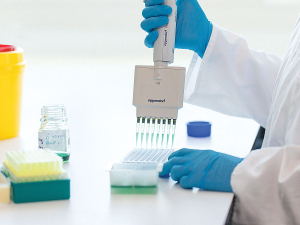Waste to Treasure: Growing value in winery waste
Wine companies have been "very generous" in gifting grape marc to a project working to transform the winemaking byproduct.
 Lincoln Agritech has been granted a $1 million contract from the Ministry of Business, Innovation and Employment to develop attenuated variants of disease-causing fungi that can be used to prime plants and protect against fungal diseases.
Lincoln Agritech has been granted a $1 million contract from the Ministry of Business, Innovation and Employment to develop attenuated variants of disease-causing fungi that can be used to prime plants and protect against fungal diseases.
Plant fungal diseases can be devastating for horticulture and agriculture - in the worst cases, wiping out entire crops.
But Lincoln Agritech scientists believe altering the bacteria associated with disease-causing fungi will lead to new strategies to protect crops.
They have picked up a $1 million contract from the Ministry of Business, Innovation and Employment (MBIE) to develop attenuated (weakened) variants of disease-causing fungi that can be used to prime plants and protect against fungal diseases. The research programme will run for two years.
"In previous research, we found that the bacteria associated with a fungus affect its ability to cause disease," Dr Jin-Hua Li explains. "Our approach will make fungi available to cause disease by changing the bacteria that are associated with the fungi."
Working with scientists from Scion, Utrecht University in the Netherlands and the Foundation for Arable Research, Lincoln Agritech scientists will test the concept on brassica plants (a genus of plants that includes cabbage, cauliflower, and broccoli).
"We will test these attenuated variants on brassica plants, such as broccoli and cabbage," Li adds.
"We will coat seeds with the altered fungus, then try to infect the seedlings with the original fungus to see whether our new products have protected the plant from infection."
Once the concept has been proven in brassica plants, it will be applied to cereal crops, and could potentially be used on several horticultural crops.
Li believes this new approach to protection will not only help New Zealand's horticulture and agriculture industries, but also provide an export opportunity.
"The global agrochemical industry is pivoting to develop new biological alternatives in response to urgent global demands for reduced chemical use."
Li gives as an example EU regulations which demand a 50% reduction in chemical pesticide use by 2030.
"Our novel biotechnology will help exporters meet the growing market demand for non-chemical disease control."
Budou are being picked now in Bridge Pā, the most intense and exciting time of the year for the Greencollar team – and the harvest of the finest eating grapes is weeks earlier than expected.
The Real Estate Institute of New Zealand (REINZ) has released its latest rural property report, providing a detailed view of New Zealand’s rural real estate market for the 12 months ending December 2025.
Rural retailer Farmlands has released it's latest round of half-year results, labeling it as evidence that its five-year strategy is delivering on financial performance and better value for members.
OPINION: "We are back to where we were a year ago," according to a leading banking analyst in the UK, referring to US president Donald Trump's latest imposition of a global 10% tariff on all exports into the US.
DairyNZ says the Government’s proposed Resource Management Act reform needs further work to ensure it delivers on its intent.
Overseas Trade Minister Todd McClay says he's working constructively with the Labour Party in the hope they will endorse the free trade agreement (FTA) with India when the agreement comes before Parliament for ratification.